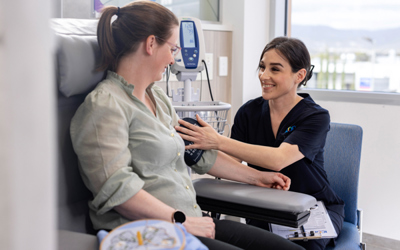What is anaemia?
Anaemia is a blood disorder which is caused by a number of different reasons, including blood loss, red blood cell destruction (also referred to as haemolysis) and the body not producing enough red blood cells (e.g. due to a deficiency of nutrients required by the bone marrow).
Types of anaemia
There are many different types of anaemia, including:
-
Iron-deficient anaemia
This type of anaemia occurs when there is not enough iron in your body. Iron is vital for the body to produce the protein haemoglobin, which transports oxygen around your body in your red blood cells.
-
Aplastic anaemia
This type of anaemia occurs if the bone marrow is significantly underactive. The bone marrow is responsible for making all the blood cells in your body, including red blood cells, white blood cells and platelets.
-
Pernicious anaemia
This type of anaemia is a disorder characterised by the body being unable to absorb enough vitamin B12 from your diet to produce red blood cells. Both vitamin B12 as well as folate (also a B vitamin) are required for healthy red blood cell formation.
-
Hemolytic anaemia
This type of anaemia occurs when red blood cells are destroyed faster than they can be made. Typically red blood cells have a lifespan of three months, however in some inherited conditions (such as sickle cell disease and thalassemia) the body destroys red blood cells before the end of their lifespan.
Risk factors for anaemia
Anaemia is relatively common in people with cancer, being seen in 40-50% in people with cancer. Anaemia in patients with cancer can be due to many different factors including:
Certain cancer treatments such as radiation therapy, as well as chemotherapy drugs – These can damage bone marrow tissue where blood cells are made. Certain drugs can also damage the kidneys, where a hormone (erythropoietin) is made, which helps make the red blood cells in the bone marrow
Certain types of cancers – Such as blood cancers and cancers that spread to the bone marrow eg. ovarian and lung tumours
Side effects of cancer and cancer treatments – These can often cause vomiting and nausea and poor appetite, which can result in low levels of iron, folate and B12
Blood loss – This can be as a result of surgery or internal bleeding arising from the cancer itself.
Signs and symptoms of anaemia
If you experience any of these symptoms, it is important you see your GP or healthcare professional straight away.
Typical symptoms of anaemia include:

Fatigue and tiredness

Dizziness

Irregular or rapid heart rate

Headaches

Pains in your chest

Cold hands or feet

Difficulty catching your breath
Treatment for anaemia
The treatment of anaemia will be dependent on your symptoms as well as the cause of your anaemia. Treatment options can include:
Supplementation – Iron, B12 or folate (folic acid) can be prescribed, usually as tablets, although iron can be given as an infusion and vitamin B12 given as an injection
Increasing your intake of iron-rich foods
Blood transfusion – If your haemoglobin is very low, or if your levels need to be increased quickly
Medication – If your anaemia is a result of chemotherapy, you may be prescribed medication that increases the production of erythropoietin, known as erythropoietin stimulating agents (ESAs), which help your bone marrow make more red blood cells.




